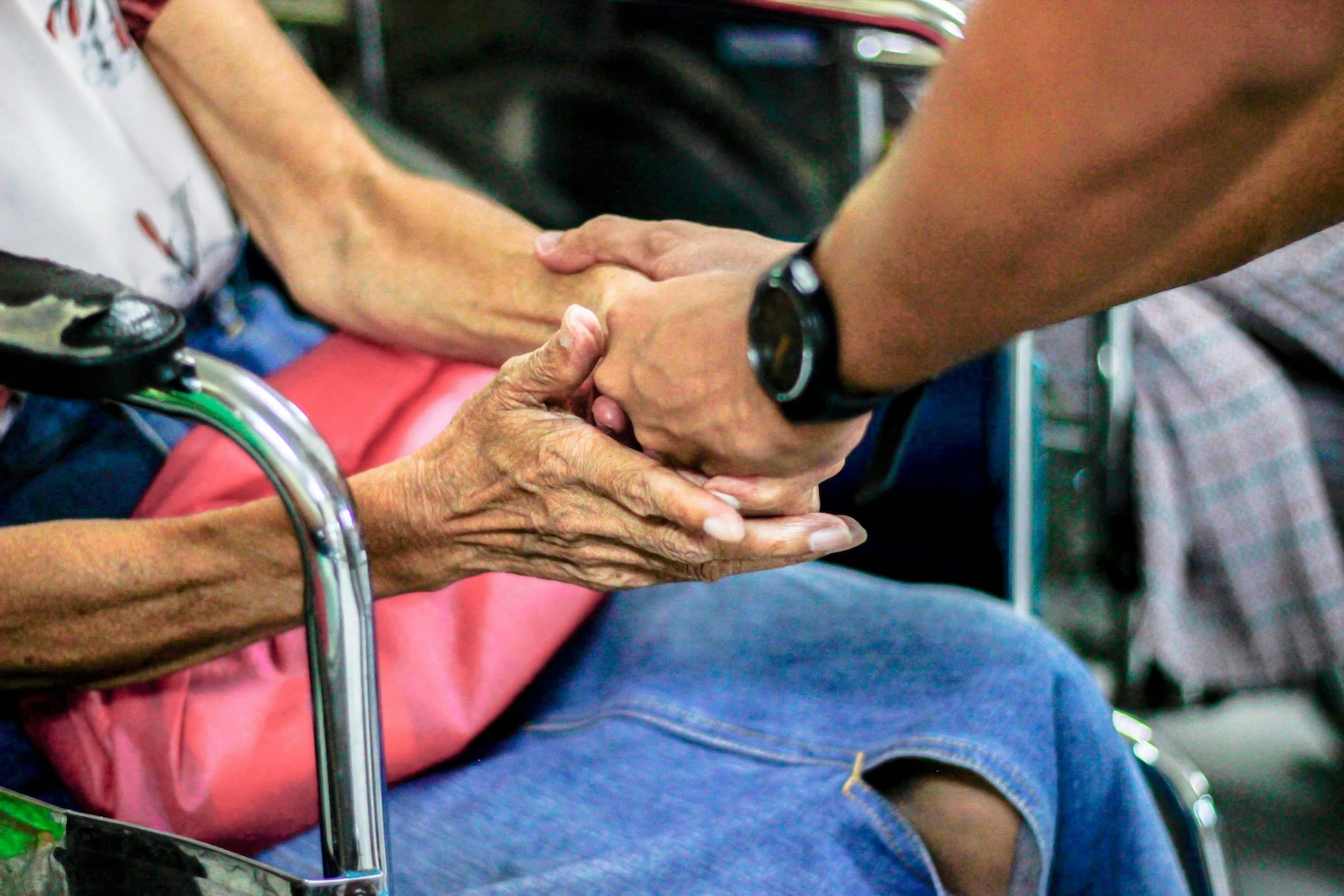We Are Doing Our Best by Eileen Cunniffe

We are everywhere, the middle-aged, aging daughters and sons. Watch us folding walkers and wheelchairs into trunks, and then unfolding them again in handicapped spaces or next to sidewalk cutouts. Watch us as we fold and unfold fragile parents in and out of cars that are somehow always too large and high or too small and low to make these transfers as smooth or as safe as we all might wish they could be.
Watch as we escort our parents to restrooms. We hover near doors, wanting not to hear too much, also wanting not to miss a call for help or, worse, an unexpected thud. Or as we watch them shuffle off, insisting they’ll be back in just a few, praying they’ll remember where they left us. Some delays are not their fault—just long lines. Other times they forget to mention that after the men’s room, they’d already planned to stop for a hotdog or a cheesesteak—both poor choices, cardiologically speaking, but we keep that to ourselves, and we tremble with relief as we focus on catching them up on that last anxiety-inducing inning-and-a-half.
In doctors’ waiting rooms we do our best to do the right thing. Sometimes we ask, Should I go in with you? Other times we insist on being in the room when the results are delivered, the dosage is adjusted, or the heart valve procedure is recommended (yet again). In emergency rooms, we bide our time—5 hours if we’re lucky, 17 hours if we’re not, because it’s Christmas, and there’s simply no room at the inn. Some of our elders take so many ambulance rides that as many as four hospital ERs have our cell phone numbers saved in their systems. In those ERs, we listen as our parents decline to discuss, let alone sign, advance directives. The closest they will come is to solemnly sign power of attorney forms, along with us, as a notary hovers over the proceedings around their kitchen table.
Frequently, we remind ourselves that all of this is new, to all of us. They were so much younger when their own parents got sick and died, failing mostly over months, not years. While they themselves were busy raising children, they could not yet imagine themselves being old. They did their best to plan for the future, never thinking they’d move from well-loved homes to senior communities, where stairs and maintenance and yard work and snow removal were no longer immediate concerns; and where medical help was just moments away, even if we, their children, could be there within the hour.
We have helped each other—siblings, friends, co-workers—understand and navigate the progressive levels of care available once “independent” stops being an option. We remind each other that not everyone has these options. We all know people whose still-married parents spent their last months or years in separate facilities. So when the time comes for one to transition from independent living, we rationalize that two parents in two sections of one community is still better than that. We commiserate across driveways, in text messages, over glasses of wine, and on the train. If we’re lucky, we have siblings, partners, or other support systems to get us through the most daunting days and the most difficult decisions.
We may be getting too old for this. Those of us at the tail end of the Baby Boom are already senior citizens, and we don’t have nearly as much “boom” as we used to. Yet we make—and often retrieve, mental notes about which arm must be eased into a coat sleeve first, because the other shoulder no longer bends as it ought to. We learn to check wounds (surgical and fall-related) and to change dressings. Discreetly, we deliver incontinence supplies to closets, we scan pill boxes, we check ankles for signs of swelling. We sign papers we never dreamed of signing: orders for “do not resuscitate,” “do not intubate.” When short-term rehab is no longer effective, we sign our parents into custodial care and even though we know this has nothing to do with janitors and we ourselves will keep showing up and giving as much hands-on, loving care as we possibly can, this dreadful phrase haunts us.
We look after our parents and their finances faithfully, even as we worry over our own 401Ks and decipher the riddles of Medicare coverage for our own, aging selves. We hesitate to turn off our cell phones, even for an hour or two; we hesitate even harder before we turn them back on.
On our best days, we acknowledge what a privilege it is to shepherd our parents through their final years. On our worst days, we meet ourselves coming and going—in bathroom mirrors, in ever-expanding incontinence aisles in drugstores, even in our own front hallways, as we wrestle with outerwear, struggling to remember which arm should go in first. We are no longer sure we want to be 90 when we grow up.
We learn to amplify every happy occasion—birthdays and graduations, holidays, weddings, and new babies—because life does go on. We plaster walls with photos, we deliver fresh peaches all through the summer, we flip through albums from favorite vacations, we give manicures and haircuts. Still, we keep social workers on speed dial, we attend regular care conferences, and we nod along as doctors, nurses, and therapists document declining mobility; then declining cognition; and finally declining appetite. We opt for hospice care, which feels at first like a betrayal, but proves to be a blessing. Eventually, we write our first obituary. And although we don’t use the words “surrounded by loving family,” we have now lived them.
 Eileen Cunniffe writes nonfiction that explores identity and experience, often through the lenses of travel, family, and work. Her writing has appeared in journals including Cutleaf Journal, Global City Review, and The RavensPerch. Her first book, Mischief & Metaphors: Essaying a Life, was published in 2023 by Shanti Arts Publishing. Find more on her website: eileencunniffe.com
Eileen Cunniffe writes nonfiction that explores identity and experience, often through the lenses of travel, family, and work. Her writing has appeared in journals including Cutleaf Journal, Global City Review, and The RavensPerch. Her first book, Mischief & Metaphors: Essaying a Life, was published in 2023 by Shanti Arts Publishing. Find more on her website: eileencunniffe.com
